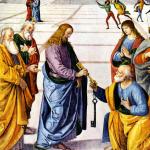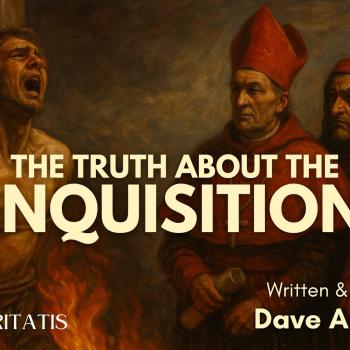Francisco Tourinho, a Brazilian Calvinist apologist (whom I’ve recently been debating on justification), wrote the following comment on one of his Facebook pages (7-26-22):
While it is true that the early Reformers supported the death penalty for heretics, it is also true that it was from the Protestant medium that tolerance and breakup with that custom emerged. It was from the Protestant medium that emerged what is defended throughout the civilized world: [the notion] that people should be free to confess whatever they believe. If there were no Protestant Reformation and the Roman Church still reigned, it is certain that we would still be living in barbarism today.
After eighteen hours, the comment had garnered 114 likes and nine shares. This is the level of outrageous disinformation that is cheerfully accepted among Francisco’s circle of Brazilian Calvinists. They pathetically exist in this dark realm of ignorance of Christian history.
I replied there (the following translated into Portugese by Google Translate, for posting on his page):
***
You must be very unfamiliar with English history. After King Henry VIII broke from the Catholic Church in 1534 (an estimated five-sixths of the English population forced to go along), and stole all of the Catholic monasteries and their financial assets, Catholicism (with a few years’ exceptions) was illegal. For the crime of being Catholic, which was equated with treason, one could be executed.
Often, the method was hanging, drawing, and quartering, where male victims were emasculated, disemboweled, sometimes having their hearts torn out while still alive, beheaded, arms and legs cut off, etc. (while “treasonous women were burned at the stake). I have four articles [one / two / three / four] documenting many of the martyrs of this persecution, lest anyone doubt it.
This is religious freedom? Catholics didn’t have full rights as citizens in England until 1829 (“Catholic Emancipation”). Many historians argue that England rejecting Catholicism was crucial and key for the Protestant movement to survive at all.
As an example of Catholic tolerance and Protestant intolerance, well over a hundred years after the “Reformation” began, I submit the colony (later a state) of Maryland, in America. It was founded by the Catholic Lord Baltimore in 1632 for persecuted Catholics. But it also offered asylum for persecuted Protestants. In fact, the majority of the initial 200 settlers were Protestant. Lord Baltimore even welcomed several hundred (vehemently anti-Catholic) Puritans, who had been persecuted in Episcopalian Virginia, into Maryland in 1648.
The religious freedom in Maryland occurred before the more famous example in Rhode Island (starting in 1636), headed by Roger Williams, a Baptist who had been persecuted by Puritans in Massachusetts. It was also 49 years before the Quaker William Penn‘s religiously tolerant Pennsylvania (the most well-known “tolerant” American colony / state). Penn had been persecuted for his faith by Anglicans in England, including being imprisoned several times in the Tower of London.
In 1649, the Maryland Toleration Act, became law. This was the first establishment of religious tolerance in the American colonies, and it protected dissenting Protestants as well as Catholics. But alas, the sunny tolerance was not to last. Puritans took over Maryland in 1691 and promptly closed Catholic churches and disallowed any Catholic teaching in public. In 1704, a law was passed “to prevent the growth of Popery in this Province”: forbidding Catholics to hold political office. Religious toleration in Maryland was not to return until the American Revolution (1775-1781).
Generally speaking, the reasons for the cessation of capital punishment for heresy (real or alleged) was due to the continual fighting in Europe over religion, for about 125 years. People tired of that, and so, especially after the Peace of Westphalia in 1648, which ended the Eighty Years War and Thirty Years War and brought peace to the Holy Roman Empire, they were exhausted by the fighting, and religious tolerance started to become the norm, by mutual consent.
I think that was a very good thing, but there was a downside to it. The decision to let others worship as they please tended to further secularism and relativism and the belief that all religious beliefs were either illusory, or all the same (indifferentism).
In other words, the less people believed; the less religious they became, the less they cared about killing those whom they believed were guilty of heresy. They no longer believed in either orthodoxy or heresy. This, along with the so-called “Enlightenment” and the French Revolution, greatly increased secularism and later, Marxism: the effects of which we live with to this day.
I don’t think we can sensibly blame Catholicism for all this, to the exclusion of Protestant involvement. The truth is far too complex and multi-faceted for that. The forces of secularism have done their damage in both the Catholic and Protestant communities. Theological liberalism came largely out of German Protestantism.
Friedrich Schleiermacher (1768 –1834), often described as the “Father of Modern Liberal Theology”, was a German Reformed theologian. Lutheranism and Calvinism underwent wide-scale degenerations into theological liberalism (with only relatively small orthodox bastions remaining): which indeed has been a perpetual problem in Protestantism ever since the 17th century. Karl Marx, though ethnically Jewish, was baptized and raised as a Lutheran.
Eventually, this liberalism took hold among some individual Catholic scholars in the late 19th century, but it hasn’t overcome the continual dogmatic teachings of the Catholic Church, which remain what they always have been. In contrast, we see denominations like the notorious Anglicans, who follow the wind of every fashionable liberal, secular trend, and almost all the Protestant denominations (with a few notable exceptions like the Missouri Synod Lutherans and Southern Baptists) have liberalized divorce, sanctioned abortion, and now so-called “homosexual marriage.”
Anglicans were also the first Christian communion to allow contraception, in 1930. No Protestant group had previously done that, and Luther and Calvin considered it murder.
But there was another reason (and a good one) that religious tolerance eventually became the norm among all Christians. The New Testament doesn’t teach execution for heresy (though the Old Testament Mosaic Law did). But in the Middle Ages, it was widely thought or assumed that a heretic must be in bad faith; that is, he knew what he held was false, but proclaimed it anyway (obstinacy and insincerity). We have since learned (through the help of sociology and psychology) that many people hold false views not solely because of obstinacy and bad faith (though that still exists, too!), but also frequently because of inadequate education, false premises, and unfortunate social and intellectual influences.
Belief formation is a very complex process. In this view, the heretic is probably — more often than not — , ignorant and misguided, a victim of false premises — rather than motivated by an evil desire to hold to falsehood and lies. The New Testament refers to ignorance lessening culpability for falsehood.
When St. Paul was in Athens, he didn’t utterly condemn the pagan Athenians for idolatry and false religion, and call for their execution. He commended them as far as possible by saying, “I perceive that in every way you are very religious” (Acts 17:22) and stated that “The times of ignorance God overlooked” (17:30). St. Peter even said to the Jews, in the context of mentioning how Jesus had been murdered, “I know that you acted in ignorance, as did also your rulers” (Acts 3:17). And of course, Jesus Himself had said about His crucifixion: “Father, forgive them; for they know not what they do” (Lk 23:34).
Writing bigoted, one-sided papers doesn’t help anyone to properly, accurately understand the true causes of religious intolerance or the movement towards tolerance. No one familiar with the history can possibly only blame Catholicism for all that, while supposedly Protestantism was exceptionally “progressive” (in a way that Catholicism was supposedly not at all) and brought about tolerance. Arguing in this way sadly helps to sustain the prejudice and cynical suspicions and conspiratorial theories that continue to tragically divide the Body of Christ to this day.
Both sides bear blame for the persecutions of the past, and both have learned a great deal about the causes and blame for heresy. Pretending that they don’t both have blame for past persecution or that the cause of toleration is primarily Protestantism hinders ecumenical progress and the mission of Christianity to the lost world.
***
Francisco replied:
No matter how many men Protestantism killed (although King Henry VIII was not Protestant, in fact he is listed as a Roman Catholic until today),
It’s a very odd “Roman Catholic” who expressly denies that the bishop of Rome, the pope, is the supreme head of the Church, and who persecutes to the death, anyone who says he is, and who believes he is higher than any earthly monarch.
but it was from within Protestantism that religious freedom arises. Do you deny this fact?
Yes, per my reasoning above, that you have not interacted with at all.
That the early Protestants were in favor of the death penalty is a fact, but it was a holdover from Rome, not in the Reformation gene.
Persecution for heresy was a product of the worldview of the Middle Ages, which held the view that if people could be executed for harming others or their property, then heretics ought to also be persecuted, on the grounds that their errors were much more dangerous and wicked than mere bodily or property harm. They harmed souls, and could help cause a person to end up in hell for eternity. Therefore, they should be executed for the good of Christian society (such was the reasoning).
Catholicism didn’t hold this view before the Middle Ages, and when it did later, it was, I contend, due to the specific outlook of the Middle Ages, and a particular (debatable) view of the relationship of Church and state.
Protestantism also held it as a “child” of the late Middle Ages, and both parties abandoned it in due course, as contrary to a fully charitable Christian outlook, but also at the same time, influenced (for good or ill) by secular trends of thinking.
The Church in Rome has a bubble called Dictatus Papae – literally “Pope’s Dictatorship”. The Pope claims himself to have power over temporary and heavenly governments, he is a dictator par excellence. His Word is Infallible and unquestionable. The Roman church is a dictator by nature. The biggest proof of this is that Communism only thrived in Roman Catholic or Orthodox countries, tell me one Protestant country that communism or dictatorial ideologies thrived? NONE! because in us, not in you, is the freedom gene.
I don’t see how forced regimes prove anything one way or another about the people who are oppressed and killed by them. I would argue that Cuba was hugely exploited by American corporate capitalism (and we all know that America is a Protestant-dominated country). This led the way to the Communists promising the world, as they always do, and the collapse of the unethical capitalist excesses there.
Ask the Catholics there how happy they are about the government. And we see how the population responded to the pope when he visited there.
Latvia was more than 60% Lutheran when the Soviets took it over, but again, I don’t blame small countries who are taken over by demonic dictatorships.
Estonia was “80% Protestant, overwhelmingly Lutheran, followed by Calvinism and other Protestant branches” (Wikipedia) before it was taken over by the Soviet Union. So that is two Protestant countries that went Communist. The question is “How did they go Communist?” Was it the choice of the population as a whole? Of course not. It never is with Communism. Thus, I don’t see that Catholicism in Cuba and Orthodoxy in Russia are primarily to blame for the sad Communist history of those countries.
*
Related Reading
My web page: Protestantism: Historic Persecution & Intolerance [made sadly necessary precisely because of historically clueless comments like Francisco’s above]
***
***
*
Summary: Brazilian Calvinist Francisco Tourinho falsely claims that Protestantism is the primary cause for religious toleration, and Catholicism the sole cause for intolerance.














